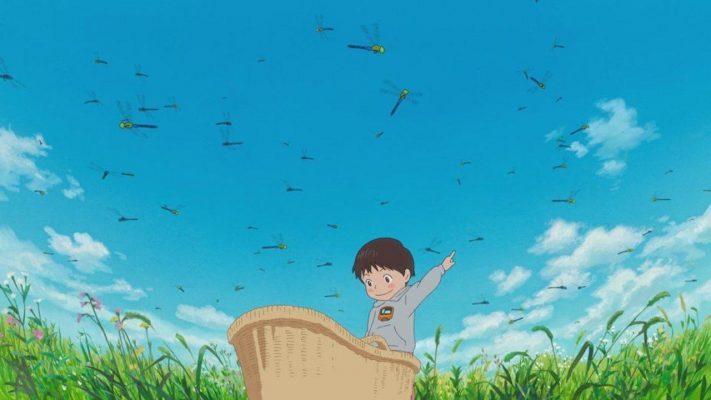@Glasgow Film Theatre, Sun 14 Oct 2018, and Filmhouse, Edinburgh, Sat 20 Oct 2018 as part of Scotland Loves Anime Festival
Writer-director Mamoru Hosoda continues his interest in both time travel and family relationships with latest film Mirai. It takes the ambitious step of focusing on a four-year-old as the protagonist in a film that is more likely to hit home with adults via its themes of parenthood, change and retrospection.
After an opening montage that brings Pixar’s Up to mind, we centre on Kun, whose sheltered life is about to be transformed with the arrival of new baby sister, Mirai. As his mother’s attention is diverted and his father is run into the ground (rather comedically), Kun begins to feel isolated and forlorn and resents his sibling as well as his parents. After some disobedient outbursts and comic scenes, he takes refuge in the minimalist garden — designed by his architect father — and enters a surreal experience as his familiar surroundings morph into a new setting and he encounters a strange man waiting for him. After initial intrigue it soon emerges that the man is, oddly, a personified manifestation of the family dog.
From here on in, the film works through a repetitive format. Kun has an episode with his sister — during which he usually comes off as a spoilt nuisance, even cruel — then escapes to a new hallucinogenic garden scene where he meets a future version of a family member. Ultimately, these experiences leads him to a realisation about his unkindness and encourage him to alter his behaviour. At times the time travelling visits become a little dry and some scenes outstay their welcome. At their best, though, they are highly imaginative, even psychedelic, and the finale alternate dimension journey becomes downright frightening — a highlight in what is at times quite a placid film.
Mirai deals with interesting ideas. Hosoda captures young family dynamics with wit and canny observation while, more holistically, he explores childhood naivety, fear and the connections we may or may not choose to make with our nearest relatives. Whilst this is admirable, the cyclical nature of the narrative does become a little trying and the perfectly average running time of 98 minutes feels like a drag at times. It also doesn’t help that Kun is, well, quite a brat for most of the film. Perhaps parents or fellow four-year-olds might view him differently.
